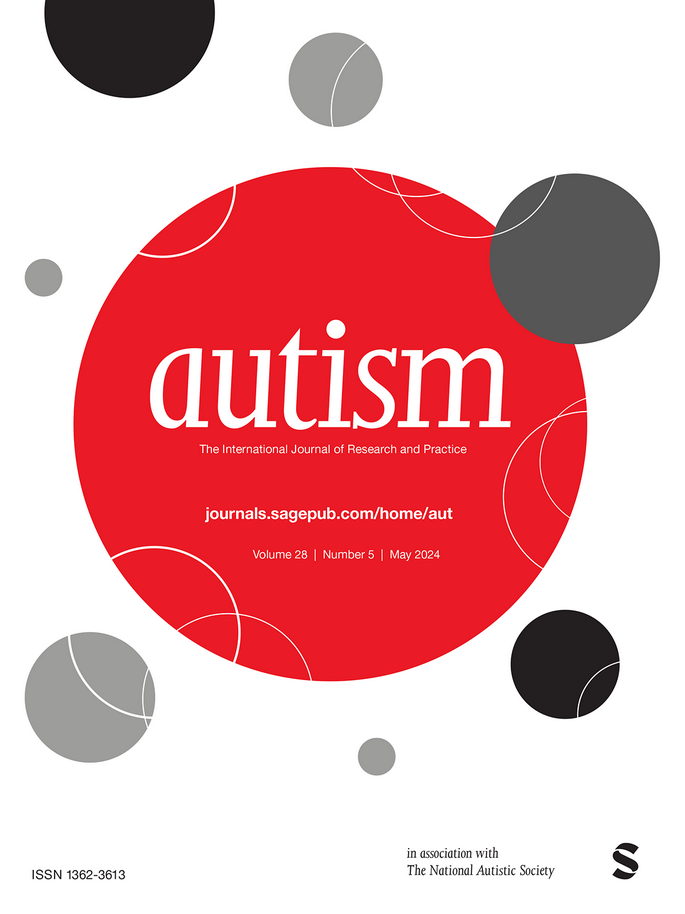“感觉不断被踢下去”:一项探索自闭症成年人排斥敏感性的定性现象学研究。
摘要
自闭症患者比非自闭症的同龄人更容易被社会排斥。在社交媒体上,自闭症成年人对社会排斥极度敏感。本定性研究探讨了该人群中高度排斥敏感性的生活经历。通过社交媒体进行有目的的抽样,招募了19名年龄在21-71岁之间的自闭症成年人(11名女性,8名男性),他们自我报告排斥敏感性升高。进行了面对面或在线半结构化访谈。采用解释现象学分析对数据进行分析,并进行综合成员检验,保证数据的准确性。参与者将他们的拒绝敏感性描述为当预期或感知到拒绝和批评时,他们的情绪和想法是非常压倒性的,令人筋疲力尽的。这些反应可能伴随着身体紧张、疼痛和重温过去的拒绝。它的强度取决于上下文因素(例如基线情绪和拒绝的主题),并且经常无效。确定的诱发因素包括固有的自闭症特征和终身被拒绝的经历。许多策略被用来缓解这些挑战,包括治疗,取得了不同程度的成功。参与者的生活经历表明,对自闭症成年人来说,高度的排斥敏感性可能是一种令人虚弱却又被忽视的经历。需要进一步的定量研究来研究其患病率、易感因素、影响和潜在的干预措施。理解自闭症成年人的拒绝敏感性:一项从生活经验中收集见解的访谈研究为什么要进行这项研究?自闭症患者比非自闭症患者更容易面临拒绝和批评。这些事件的压力有多大取决于他们的拒绝敏感性。拒绝敏感度高的人对被拒绝更焦虑,更快地认为自己被拒绝了,在被拒绝时反应也更强烈。一些自闭症成年人在社交媒体上形容自己的拒绝敏感性非常高。这项研究旨在更好地了解这些自闭症成年人是如何经历排斥敏感性的,以及它是如何影响他们的日常生活的。研究人员做了什么?我们采访了19名年龄在21岁到71岁之间的自闭症患者,他们对排斥反应非常敏感。这些采访可以是面对面的,也可以是在线的。在对访谈进行分析后,我们与参与者分享了调查结果,以检查它们是否与他们的经历相符。研究人员发现了什么?参与者将他们的拒绝敏感性描述为压倒性的和令人筋疲力尽的。当他们感到被拒绝或被批评,或担心将来会发生这种情况时,他们会经历强烈的情绪和身体反应,如过度思考、紧张和痛苦。他们也可能在这些时刻重新体验过去被拒绝或批评的记忆。这些反应的强度因情况而异,并经常被其他人(包括卫生保健专业人员)驳回。参与者认为,他们的拒绝敏感性来自于他们的自闭症特征和终身被拒绝的经历。有些人尝试治疗或其他方法来应对他们的排斥敏感性,成败参半。这些发现意味着什么?这项研究表明,对于自闭症成年人来说,高排斥敏感性可能是一个严重的、经常被忽视的挑战。需要更多的研究来更好地理解它,并用这种经历来支持他们。Autistic individuals are at greater risk of social rejection than non-autistic peers. On social media, adults with autism report an extreme sensitivity to social rejection. This qualitative study explored lived experiences of heightened rejection sensitivity in this population. Purposive sampling through social media was used to recruit 19 autistic adults aged 21-71 (11 women, 8 men) who self-reported heightened rejection sensitivity. Face-to-face or online semi-structured interviews were held. Interpretative phenomenological analysis was utilized to analyse the data, and synthesized member checking was conducted to ensure data accuracy. Participants described their rejection sensitivity as profoundly overwhelming, exhausting emotions and thoughts when anticipating or perceiving rejection and criticism. These responses could be accompanied by physical tension, pain and reliving past rejections. Its intensity varied greatly depending on contextual factors (e.g. baseline mood and topic of rejection) and was frequently invalidated. Identified predisposing factors included inherent autistic traits and lifelong rejection experiences. Many strategies were employed to alleviate these challenges, including therapy, with varying success. The participants' lived experiences show that heightened rejection sensitivity can be a debilitating yet overlooked experience in autistic adults. Further quantitative research is needed to study its prevalence, predisposing factors, impact and potential interventions.Lay abstractUnderstanding rejection sensitivity in autistic adults: An interview study to gather insights from lived experiencesWhy was this study done?Autistic individuals are more likely to face rejection and criticism than non-autistic individuals. How stressful these events are can depend on their rejection sensitivity. People with higher rejection sensitivity are more anxious about being rejected, are quicker to think that they are being rejected and have stronger reactions when rejection happens. Some autistic adults on social media describe their rejection sensitivity as extreme. This study aimed to better understand how these adults with autism experience their rejection sensitivity and how it affects their daily lives.What did the researchers do?We interviewed 19 adults with autism, aged 21 to 71, who experience high rejection sensitivity. These interviews were done either face-to-face or online. After analysing the interviews, we shared the findings with participants to check if they matched their experiences.What did the researchers find?Participants described their rejection sensitivity as overwhelming and exhausting. When they felt rejected or criticized, or feared this would happen in the future, they experienced strong emotional and physical reactions, such as overthinking, tension and pain. They could also re-experience memories of past rejection or criticism during these moments. The intensity of these responses varied depending on the situation and was often dismissed by others, including healthcare professionals. Participants felt that their rejection sensitivity came from a combination of their autistic traits and lifelong experiences of being rejected. Some tried therapy or other ways to cope with their rejection sensitivity, with mixed success.What do the findings mean?This study shows that high rejection sensitivity can be a serious and often overlooked challenge for autistic adults. More research is needed to understand it better and support them with this experience.

 求助内容:
求助内容: 应助结果提醒方式:
应助结果提醒方式:


